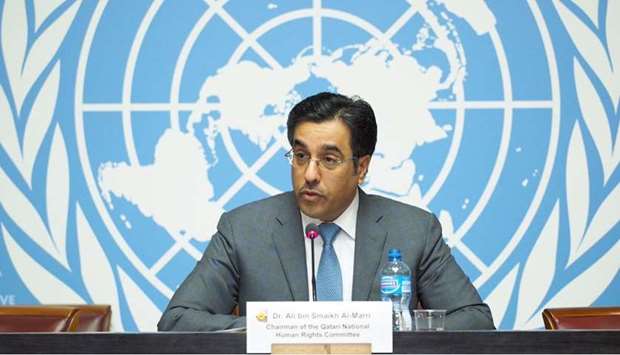*UAE committed 2,105 rights violations since blockade NHRC documents 2,105 rights violations against UAE
HE the Chairman of the National Human Rights Committee (NHRC) Dr Ali bin Smaikh al-Marri has criticised the UAE's continued violations of the rights of Qatar's citizens and residents.
He noted that there were 2,105 violations documented since the beginning of the blockade, 1,212 of which occurred following the decision of the International Court of Justice (ICJ).
Al-Marri also announced that a report on the violations by Saudi Arabia's of citizens and residents of Qatar is also close to completion. He said that the report will be presented to the Committee on the Elimination of Racial Discrimination.
Speaking to reporters in Geneva, al-Marri said that Abu Dhabi did not establish clear mechanisms to implement the ICJ ruling, stressing that this confirms the country's continued discriminatory measures against Qatar's citizens and residents. He called on the ICJ, the UAE, and the State of Qatar to swiftly respond to the recommendations of NHRC in the conclusion of its report, in order to end the violations of the blockade.
The NHRC chairman will meet on his Geneva visit officials from the Office of the United Nations High Commissioner for Human Rights and present them with the second report documenting the UAE's violations of the ICJ ruling. He said the NHRC will contact the UN Secretary-General, the President of the International Court of Justice, The United Nations High Commissioner for Human Rights, head of the Committee on the Elimination of Racial Discrimination, UN Special Rapporteurs, EU Parliament Speakers, in addition to 600 international organisations and urge them to immediately pressure the UAE to follow the ruling of the court and end its violations. He also noted that the committee will send the report to all UN diplomatic missions.
The second report on the continued violations of the UAE is titled 'UAE's disregard for the ruling of the International Court of Justice'. It is part of a series of reports on the negative impacts the blockade has had on human rights in Qatar. Al-Marri said the report, in addition to the comprehensive data it provides, delves deep into some of the cases that confirms the UAE's failure to adhere to the ruling.
He said the violations in the report were documented by the committee's researchers, who met with the victims and verified their stories. The report also included the complaints the researchers received by phone or on e-mail since the beginning of the blockade and after the court ruling.
The report divided the violations into two main categories. The first were the violations of the right to family reunification, right to education, the right to have access to courts. A total of 1,212 such violations were documented. This category of violations is directly connected to the ICJ ruling. The second category was related to hate speech against Qatar and its residents.
The breakdown of the 1212 violations were as follows: 90 in the violations of the right to family reunification, 155 violations of the right to education, and 967 violations of the right to sue and have access to courts.
"UAE's claim that they did not take any discriminatory measures since the beginning of the blockade were misleading," the report said noting that many international organisations, diplomatic missions, in addition to the report of the United Nations High Commissioner for Human Rights confirmed the existence of these measures.
The committee also documented hundreds of cases of people who were deported by the UAE authorities without regard for their humanitarian conditions. Those deported included people with joint family in the two countries, students, property owners, people with disabilities, as well as people receiving medical attention.
The report said there was no progress on the 90 violations of the right to family reunification, with families continuing to find difficulty in being together. There were also cases of obstacles placed by the UAE, preventing family meetings.
Regarding the arbitrary measures taken by the UAE with regards to the right to education, the report said Qatar has succeeded in resolving some of these cases, but maintained that those students continue to face severe difficulties. These difficulties include expulsion, the closure of their online accounts and records, as well as the refusal to provide a transcript of their grades. That is in addition to the fact that they will graduate later than they should, due to their compulsory transfer to another university.
The report said the UN Special Rapporteur on the Right to Education visited Doha twice and met with a number of the victims. The rapporteur contacted the UAE twice as well, demanding they protect the right to education.
On the access to courts, the report said Qatari citizens and residents were deprived of their right to sue and to fair trial, despite the fact that it is part of the UAE's commitments under international agreements the country signed. The NHRC said that the action was a dangerous precedent, stressing that the UAE must differentiate between court rulings and political goals.
He noted that there were 2,105 violations documented since the beginning of the blockade, 1,212 of which occurred following the decision of the International Court of Justice (ICJ).
Al-Marri also announced that a report on the violations by Saudi Arabia's of citizens and residents of Qatar is also close to completion. He said that the report will be presented to the Committee on the Elimination of Racial Discrimination.
Speaking to reporters in Geneva, al-Marri said that Abu Dhabi did not establish clear mechanisms to implement the ICJ ruling, stressing that this confirms the country's continued discriminatory measures against Qatar's citizens and residents. He called on the ICJ, the UAE, and the State of Qatar to swiftly respond to the recommendations of NHRC in the conclusion of its report, in order to end the violations of the blockade.
The NHRC chairman will meet on his Geneva visit officials from the Office of the United Nations High Commissioner for Human Rights and present them with the second report documenting the UAE's violations of the ICJ ruling. He said the NHRC will contact the UN Secretary-General, the President of the International Court of Justice, The United Nations High Commissioner for Human Rights, head of the Committee on the Elimination of Racial Discrimination, UN Special Rapporteurs, EU Parliament Speakers, in addition to 600 international organisations and urge them to immediately pressure the UAE to follow the ruling of the court and end its violations. He also noted that the committee will send the report to all UN diplomatic missions.
The second report on the continued violations of the UAE is titled 'UAE's disregard for the ruling of the International Court of Justice'. It is part of a series of reports on the negative impacts the blockade has had on human rights in Qatar. Al-Marri said the report, in addition to the comprehensive data it provides, delves deep into some of the cases that confirms the UAE's failure to adhere to the ruling.
He said the violations in the report were documented by the committee's researchers, who met with the victims and verified their stories. The report also included the complaints the researchers received by phone or on e-mail since the beginning of the blockade and after the court ruling.
The report divided the violations into two main categories. The first were the violations of the right to family reunification, right to education, the right to have access to courts. A total of 1,212 such violations were documented. This category of violations is directly connected to the ICJ ruling. The second category was related to hate speech against Qatar and its residents.
The breakdown of the 1212 violations were as follows: 90 in the violations of the right to family reunification, 155 violations of the right to education, and 967 violations of the right to sue and have access to courts.
"UAE's claim that they did not take any discriminatory measures since the beginning of the blockade were misleading," the report said noting that many international organisations, diplomatic missions, in addition to the report of the United Nations High Commissioner for Human Rights confirmed the existence of these measures.
The committee also documented hundreds of cases of people who were deported by the UAE authorities without regard for their humanitarian conditions. Those deported included people with joint family in the two countries, students, property owners, people with disabilities, as well as people receiving medical attention.
The report said there was no progress on the 90 violations of the right to family reunification, with families continuing to find difficulty in being together. There were also cases of obstacles placed by the UAE, preventing family meetings.
Regarding the arbitrary measures taken by the UAE with regards to the right to education, the report said Qatar has succeeded in resolving some of these cases, but maintained that those students continue to face severe difficulties. These difficulties include expulsion, the closure of their online accounts and records, as well as the refusal to provide a transcript of their grades. That is in addition to the fact that they will graduate later than they should, due to their compulsory transfer to another university.
The report said the UN Special Rapporteur on the Right to Education visited Doha twice and met with a number of the victims. The rapporteur contacted the UAE twice as well, demanding they protect the right to education.
On the access to courts, the report said Qatari citizens and residents were deprived of their right to sue and to fair trial, despite the fact that it is part of the UAE's commitments under international agreements the country signed. The NHRC said that the action was a dangerous precedent, stressing that the UAE must differentiate between court rulings and political goals.



